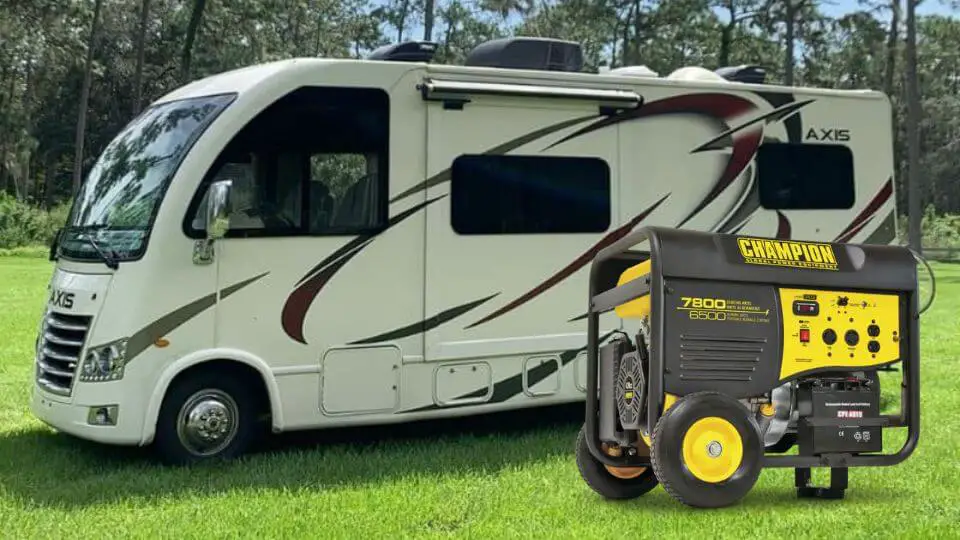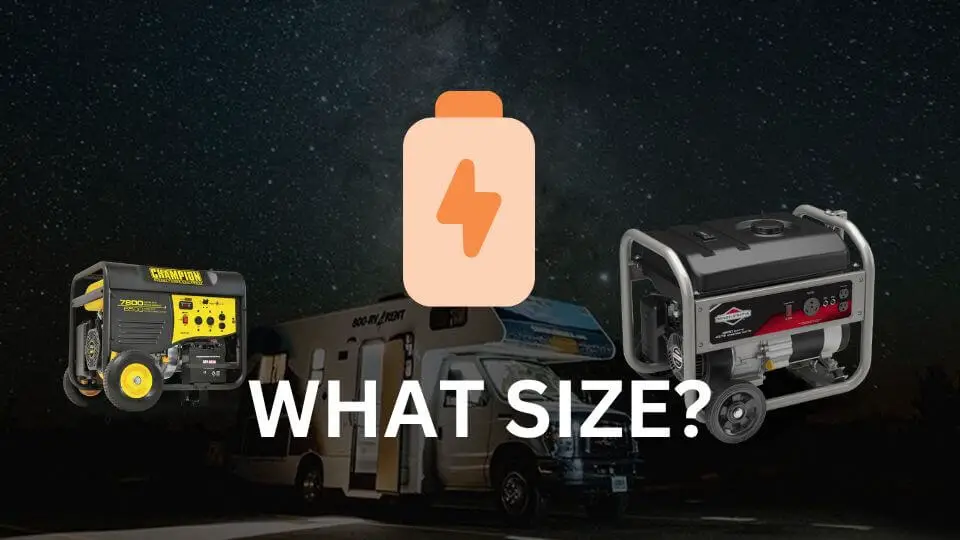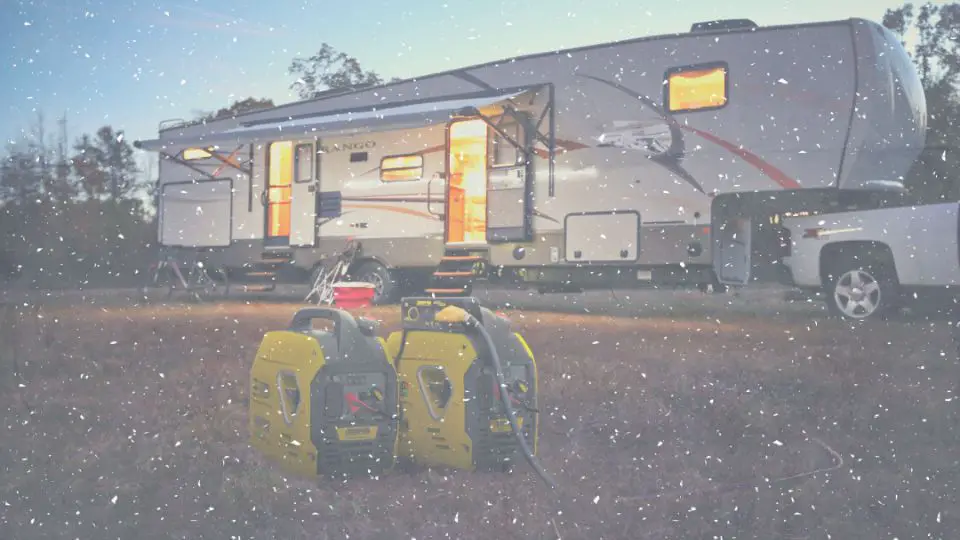This post may contain affiliate links. As an affiliate, we earn from qualifying purchases. We get commissions for purchases made through links in this post.
When planning a camping trip in an RV, it’s essential to ensure that you have all the necessary equipment to make your trip comfortable and enjoyable. One of the most important pieces of equipment you’ll need is a generator to power your RV’s air conditioning system. However, choosing the right size generator can be a daunting task, especially if you plan to run 2 AC units.
The size of the generator you need to power two AC units in your RV depends on several factors, including the size of your RV, the BTU rating of your AC units, and the wattage requirements of other appliances you plan to run. Keep reading to find out what size generator you will need to run 2 big AC units in your camper.
It’s important to note that running 2 aircon simultaneously will require more power than running just one. Therefore, it’s crucial to choose a generator with a higher wattage output than the minimum requirements for your RV. By doing so, you can ensure that you have enough power to run all your appliances, including your air conditioners, without overloading your generator.
What size AC does a typical RV have?
When it comes to RV air conditioners, there are typically two sizes that are most commonly used: 13,500 BTU and 15,000 BTU. However, other sizes do exist as well. The BTU rating of an AC unit is essentially its cooling capacity. A 15,000 BTU unit has a greater cooling capacity than a 13,500 BTU unit but will require more power to run.
Most RVs come with a 13,500 BTU air conditioner as standard. This size is suitable for most RVs and provides adequate cooling in most situations.
It is important to note that the size of the AC unit will affect the size of the generator required to power it. A 13,500 BTU unit typically requires at least 2,750 watts to start up, while a 15,000 BTU unit will require around 3,500 watts to start up. Therefore, it is important to choose a generator that can provide enough power to start up and run your AC unit(s) effectively.
In addition to the size of the AC unit, other factors such as insulation, ventilation, and the number of windows in your RV can also affect the cooling efficiency of your AC. It is important to have proper ventilation and insulation to ensure that your AC unit is working at its maximum capacity and to reduce the load on your generator.
What size generator for an RV with 2 AC units?
When it comes to running two AC units on an RV, the size of the generator needed will depend on the BTU (British thermal unit) of each unit. As a general rule, a Class A RV with 2 AC units, each with a capacity of 15,000 BTU, will require a generator with a capacity of 7,000 to 8,000 watts of startup power.
If you’re running 2 AC units of 13,500 BTU each, you are going to require a generator that can provide at least 5,500 starting watts.
It is important to keep in mind that other factors can affect the power needs of the RV, such as the size and type of additional appliances and electronics being used. Therefore, it is important to take a slightly (500-1000) Watts bigger generator if you’re planning to run multiple appliances simultaneously while running two aircon.
In general, a generator with a capacity of at least 7,500 watts is a good starting point for running two AC units on any RV. This will provide enough power to start and run the AC units, as well as other necessary appliances and electronics.
How many watts does it take to run 2 RV Air conditioners?
Running two RV air conditioners at the same time requires double the amount one air conditioner demands.
Typically, an RV air conditioner requires between 1250 to 1500 watts to run. This yields 2,500 to 3,000 watts of power altogether. Having said that, every AC requires at least double running watts in order to start. For 2,500 and 3,000 running watts this results in 5,000 and 6,000 starting watts correspondingly. However, most RV ACs mentioned would require slightly more, in most cases it is 2,750 and 3,500 startup power, which results in 5,500 to 7,000 initial power draw.
It is important to note that the wattage requirement may vary depending on the brand, model, and size of the AC units. It is recommended to check the manufacturer’s specifications to determine the exact wattage requirement for each AC unit.
In summary, running two RV air conditioners simultaneously will require a generator with a wattage capacity of at least 5,500 watts. It is important to check the manufacturer’s specifications for each AC unit to determine the exact wattage requirement.
Will a 4500-watt generator run 2 AC units?
When it comes to running two AC units on an RV, the size of the generator is an essential factor to consider. A 4500-watt generator is a popular choice among RV owners, but can it run two AC units simultaneously?
The answer depends on the specific AC units and their wattage requirements, as well as the wattage requirements of other appliances that will be running at the same time. Generally, a 4500-watt generator will not be sufficient to power two AC units at once, especially if they are both 15,000 BTU units.
Here is a breakdown of the wattage requirements for running two AC units on an RV:
- 2 x 13,500 BTU AC units require 5,500 watts to startup and 2,500 watts to run
- 2 x 15,000 BTU AC units require around 7,000 watts to start up and 3,000 watts to run
Based on the numbers provided above, it is clear and obvious that one 4,500-watt generator is not enough for running the most popular size of RV AC, which is 13,500 if you want to run two units simultaneously.
Conclusion
Choosing the right size generator to power two AC units in an RV is crucial for a comfortable camping experience. The size of the generator depends on factors such as the BTU rating of the AC units, the wattage requirements of other appliances, and the overall power needs of the RV. Generally, for two 13,500 BTU AC units, a generator with at least 5,500 starting watts is recommended, while for two 15,000 BTU units, a generator with around 7,000 starting watts is required. It’s important to consider other factors like ventilation, insulation, and additional appliances when determining the generator’s capacity. Ultimately, selecting a generator with sufficient power ensures that all appliances, including the AC units, can operate without overloading the generator.



